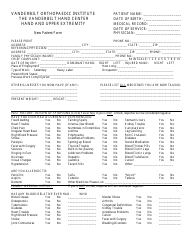Upper Lower Respiratory Infections Form
The Upper Lower Respiratory Infections Form is used for documenting information about respiratory infections that affect both the upper and lower respiratory tracts. This form helps in tracking and monitoring the symptoms, diagnosis, and treatment of such infections.
The Upper Lower Respiratory Infections form is typically filed by healthcare professionals or medical staff who diagnose and treat such infections.
FAQ
Q: What are upper respiratory infections?
A: Upper respiratory infections are infections that affect the nose, throat, sinuses, and upper airways.
Q: What are lower respiratory infections?
A: Lower respiratory infections are infections that affect the lungs and lower airways.
Q: What are some common symptoms of upper respiratory infections?
A: Common symptoms of upper respiratory infections include sneezing, runny nose, sore throat, cough, and congestion.
Q: What are some common symptoms of lower respiratory infections?
A: Common symptoms of lower respiratory infections include cough, shortness of breath, chest pain, and fever.
Q: What are the causes of upper respiratory infections?
A: Upper respiratory infections are commonly caused by viruses, such as the common cold or flu.
Q: What are the causes of lower respiratory infections?
A: Lower respiratory infections can be caused by viruses, bacteria, or other pathogens.
Q: How are upper respiratory infections treated?
A: Most upper respiratory infections are caused by viruses and do not require antibiotics. Treatment focuses on symptom relief, such as rest, fluids, and over-the-counter medications.
Q: How are lower respiratory infections treated?
A: Treatment for lower respiratory infections depends on the cause. Bacterial infections may require antibiotics, while viral infections are typically managed with rest, fluids, and over-the-counter medications.
Q: Can upper respiratory infections be prevented?
A: Some ways to prevent upper respiratory infections include practicing good hand hygiene, avoiding close contact with sick individuals, and getting vaccinated.
Q: Can lower respiratory infections be prevented?
A: Lower respiratory infections can be prevented by practicing good hand hygiene, avoiding close contact with sick individuals, and getting vaccinated, especially for diseases like pneumonia and influenza.


